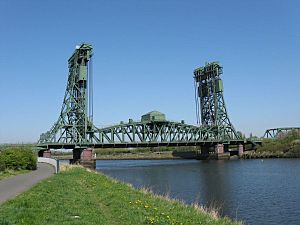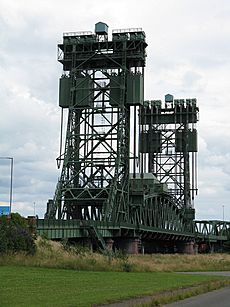Tees Newport Bridge facts for kids
Quick facts for kids Tees Newport Bridge |
|
|---|---|

Tees Newport Bridge
|
|
| Coordinates | 54°34′18.73″N 1°15′40.9″W / 54.5718694°N 1.261361°W |
| Carries | Motor vehicles, A1032 road |
| Crosses | River Tees and railway line |
| Locale | Middlesbrough, England |
| Official name | Tees Newport Bridge |
| Preceded by | Tees Viaduct |
| Followed by | Tees Transporter Bridge |
| Characteristics | |
| Design | vertical lift |
| Material | steel, concrete |
| Longest span | 82 m (269 ft) |
| Number of spans | 9 |
| Piers in water | 2 |
| History | |
| Designer | Mott, Hay and Anderson |
| Opened | 28 February 1934 |
The Tees Newport Bridge is a special kind of bridge called a vertical-lift bridge. It crosses the River Tees in the northeast of England. This bridge connects Middlesbrough with the area of Stockton-on-Tees. It was finished in 1934. Even though it used to lift up to let ships pass, it no longer does. Today, it stays in its down position and works only as a road bridge.
Contents
How the Bridge Was Designed
The Tees Newport Bridge was designed by a company called Mott, Hay and Anderson. It was built by a local company named Dorman Long. This company also built other famous bridges, like the Tyne Bridge and the Sydney Harbour Bridge. The Tees Newport Bridge was the first large vertical-lift bridge ever built in Britain.
Lifting Mechanism
The bridge has two tall towers, each about 55 meters (180 feet) high. The main part of the bridge, which is 82 meters (269 feet) long, weighs 2,700 tonnes. This huge section could be lifted up using two powerful electric motors. These motors could raise the bridge at a speed of 16 meters (52 feet) per minute. It could go up to a maximum height of 37 meters (121 feet).
If the electric motors ever failed, there was a backup petrol engine ready to help. If both systems somehow stopped working, workers could even lift or lower the bridge by hand. This would have been a very hard job! In 1963, a person who worked on the bridge said it would take 12 men eight hours to move it manually.
Opening and How it Worked
The Tees Newport Bridge was officially opened on February 28, 1934. A very important person, Prince Albert, Duke of York, who later became King George VI, helped open it.
Bridge Operations
When the bridge first opened, 12 people worked there all day and night. Usually, four of them were needed to operate the bridge at any time. They controlled the bridge from a special room located in the middle of the bridge span. In the 1940s and early 1950s, the bridge would lift up to twice a day. About 800 ships each year would pass underneath it.
Over time, fewer and fewer ships needed to travel up the River Tees to Stockton-on-Tees. Because of this, the bridge was used less often for lifting.
When the Lifting Stopped
In 1989, a law was changed, so the bridge no longer had to lift for ships. The last time the bridge was lifted was on November 18, 1990. Mr. Ian MacDonald, who worked on the bridge for many years, was in charge of this final lift.
Today, the Tees Newport Bridge is still an important road bridge. It carries a lot of traffic as part of the A1032 road. This is true even though another large bridge, the A19 Tees Viaduct, is nearby.
Bridge Maintenance
In recent years, the bridge was repainted in its original green color. Some small repairs were also done to its wire ropes and counterweights. These parts still hold most of the bridge's weight. In 1988, the bridge was given a special status as a Grade II Listed Building. This means it is an important historical structure.
In July 2014, work began to paint the bridge red and silver. This was done to celebrate its 80th anniversary. The painting took longer and cost more than planned. This was mainly because the steel parts of the bridge were in poor condition from not being maintained enough.
The Admiralty, which is like the navy's map and sea information office, still shares tide times for the bridge's location. This is because some ships still dock along the River Tees up to the Tees Newport Bridge.


